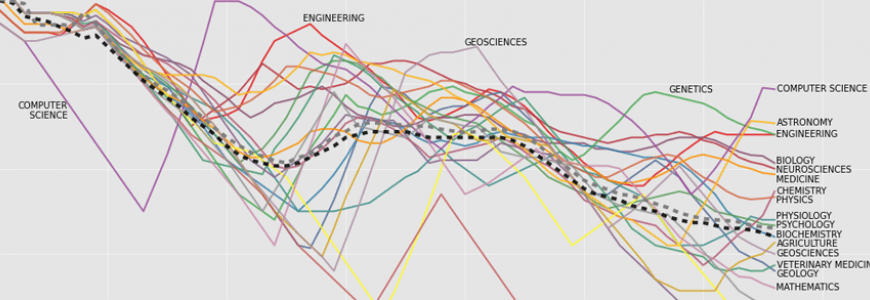By Rob Mitchum // February 11, 2015
Science appears to be slowing down. Over the course of Knowledge Lab Postdoc Aaron Gerow‘s research in how scientific publications influence one another, he found that as fields develop bodies of research, their citations tend to lag several years behind the present day.
Using data from the Web of Science dating back to 1940, Gerow analyzed the average age of citations for every year in different fields to measure their “speed”.
“If you look at a given paper, you’ll see a distribution of the dates of the outbound citations — the dates of the papers that a particular paper cites,” said Gerow. “And most papers will cite mostly papers from a few years ago, a few papers from a long ago, and a few very recent papers.”
Each line in Gerow’s graph above represents the trend in citation age for a specific field. To put a number on a field’s speed in a given year, Gerow found the most common age of the citations of papers in that field. For example, in 1953, papers in computer science cited 1941 papers most often, whereas scientific papers as a whole tended to cite four-year-old papers. So with this relatively naive metric, computer science in 1953 is “slower” than science as a whole, and its graph is much steeper than the main cluster of fields and sub-fields.
“Every field starts off as fast as possible,” said Gerow, “because there’s literally nothing to cite. So as these lines move down, part of the reason is that they’re just developing more and more papers that they can cite. But as things level off, you start to see real trends.”
Explaining those trends is the hard part. Some fields entertain relatively straightforward explanations. Astronomy’s jump in the late 1990s, for example, may correspond to the development of computational methods to discover supernovas. And by 2006, fields like computer science and engineering are moving much faster than, say, psychology and biochemistry.
“The intuitive explanation is that high-tech fields are fast-paced and exciting,” said Gerow, “whereas innovations in more mature fields like mathematics and medicine take much longer to adopt.”
Overall, Gerow’s research poses more questions than answers: Is the curve upwards in the 1960s due to Cold War collaboration, an influx of funding, or an unrelated shift in scientists’ ages? How much does the variation between fields depend on Web of Science’s definitions? And, most importantly, is this a good metric for the speed of science?
Reprinted from the Knowledge Lab website. Aaron Gerow is a Postdoctoral Scholar at the University of Chicago’s Knowledge Lab. Email: gerow [at] uchicago [dot] edu


